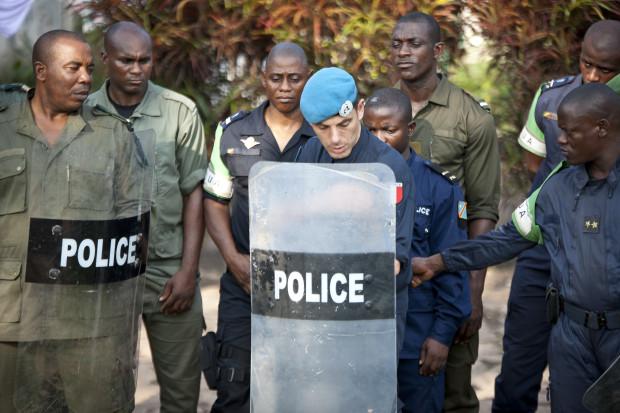A Hippocratic Africa Policy
 The past decade of U.S. Africa policy has made some wish most for policies that would “first, do no harm.” A Hippocratic test could be useful for President Obama’s new Africa team at the NSC and the State Department, as they reflect on the harm that has punctuated their predecessors’ policies towards many African countries.
The past decade of U.S. Africa policy has made some wish most for policies that would “first, do no harm.” A Hippocratic test could be useful for President Obama’s new Africa team at the NSC and the State Department, as they reflect on the harm that has punctuated their predecessors’ policies towards many African countries.
The sins fall into (at least) three categories: omission, commission, and intersecting them at times, militarization. Here are three. First, “democratic” elections in Nigeria and, relatedly, Kenya; this could also be called non-regime-change. Second, fear and loathing of “Islamist” regimes, as in Somalia; thus, regime change. Finally, the rushed creation of AFRICOM, with a mission that looks likely to ingest functions of the State Department and USAID.
In Nigeria missed opportunities and worse have led to pervasive pessimism as Nigerians face the future. Key in this was President Olusegun Obasanjo, fresh from political imprisonment, who became president in May 1999 through an only slightly flawed election. Nigerians and Americans alike rejoiced at the departure of the military; Obasanjo had more goodwill at home and abroad than any head of state before him. The relief in Washington was palpable, and largely set the tone for the next nine years: Washington could rely on Obasanjo’s help on African and other global issues and wouldn’t have to worry about Nigeria’s stability.
In 2003 elections were due again. Washington didn’t want to know about political assassinations, intimidation and looming fraud. The elections themselves, taking rigging and violence to new depths, bore out Nigerians’ and observers’ worst fears. But from official Washington, only silence. Further, just weeks after Obasanjo’s second swearing-in, President Bush paid his only visit to Abuja, signaling to Nigerians U.S. approval of what had happened.
Months later rumors began circulating that Obasanjo wanted to change the constitution to secure a third term, a project he denied but Nigerians gradually knew to be his priority. The embassy in Abuja, with a new ambassador, sent ample warning to Washington, producing no effort to dissuade him.
Nigerians managed to mobilize and defeat the constitutional change in May 2006, and a period of uncertainty and anxiety followed. It was clear that the electoral commission, whose chairman was nominated by the president, was unable or unwilling to conduct free and fair elections. This time, the U.S. Embassy in Abuja and professionals in Washington were reporting and analyzing fully.
But from Washington came no pressure to remedy the impending election disaster. On the contrary, when the issue that had been Obasanjo’s policy priority from the start-debt forgiveness for Nigeria-was coming to fruition, the Treasury Department helped out; no one asked for anything in return.
When the 2007 election of Obasanjo’s hand-picked successor proved to be another travesty, as reported by Nigerian and international observers alike, Washington withheld congratulations briefly, and then recognized “reality.” Other problems were more pressing.
Such as Kenya’s upcoming elections. Two points here: first, that President Mwai Kibaki is known to have said that Nigeria’s elections showed that the U.S. didn’t care, as long as the result was a seemingly stable government and reliable ally. The tragic consequences of that assumption are well known. The New York Times has just reported the suppression by the Nairobi embassy-on whose instructions from Washington it doesn’t say-of exit polling, done by the International Republican Institute, that showed initial results favoring the challenger, Raila Odinga. This echoes the Abuja Embassy’s attitude towards Obasanjo’s reelection in 2003.
The harm done in Nigeria and Kenya is obvious.
Meanwhile, proactive, regime-change policy is evident in Somalia, where American attempts at engagement since 1991 have had far-reaching consequences for the region and U.S. policy alike. After 9/11, Jendayi Frazier, first at the NSC and then as Assistant Secretary for African Affairs, focused, along with the Pentagon, on fighting Islamist terrorism in the Horn. In Somalia in 2006, an alliance called the Islamic Courts Union (ICU) finally brought peace to Mogadishu and much of southern Somalia. But it was “Islamist,” and the Bush administration reacted by urging the Ethiopian army to invade and seize control of the country. It installed an alternative government, which could never function beyond Baidoa and eventually, not even there.
No one who knows the history of the Horn could imagine the Somalis welcoming an Ethiopian force. In the fighting that followed, thousands of Somali civilians died, and now the Ethiopian soldiers are gone. The Somali parliament, which was able to meet only in Djibouti, has just elected a new president: Sheik Sharif Ahmed, now heading the Alliance for the Re-liberation of Somalia, is the moderate Islamist who, in 2006, headed the ICU. Somalis in Mogadishu cheer! Somalia “has come nearly full circle.”
The “nearly” part is that now there is a strong Al Shabaab, a more radical breakaway group from the ICU, whose fighters control much of south-central Somalia, including key towns. And there is escalating piracy, fueled by the lack of effective government on shore, but which, ironically, had been controlled by the ICU in 2006.
The harm-to Somalis and to how they view the United States-is obvious.
And finally, AFRICOM. Presented first as a simple reorganization, unifying previously divided U.S. military activities in Africa under one command, AFRICOM has grown into something new. Highly unpopular among African governments, which have denied it a base on the continent, it now will undertake development projects and engage with African governments through civilian deputy leadership-apparently assuming aspects of the State Department’s and USAID’s traditional roles.
This is happening in part because far greater resources are available to the military than to the State Department, a fact recently deplored, notably, by Secretary of Defense Robert Gates. In Africa the harm has not yet been done, but the potential can easily be imagined, from the Horn of Africa, to the Sahel, to the Niger Delta and elsewhere. The hope is that the new Africa team in Washington may reexamine the structure now being elaborated at AFRICOM’s headquarters-in Stuttgart.
With this, as with all of Africa’s challenges, remembering Hippocrates is a place to begin.






